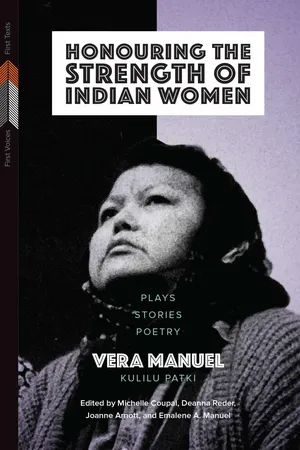
Honouring the Strength of Indian Women
Plays, Stories, Poetry
- 216 pages
- English
- ePUB (mobile friendly)
- Available on iOS & Android
Honouring the Strength of Indian Women
Plays, Stories, Poetry
About This Book
This critical edition delivers a unique and comprehensive collection of the works of Ktunaxa-Secwepemc writer and educator Vera Manuel, daughter of prominent Indigenous leaders Marceline Paul and George Manuel. A vibrant force in the burgeoning Indigenous theatre scene, Vera was at the forefront of residential school writing and did groundbreaking work as a dramatherapist and healer. Long before mainstream Canada understood and discussed the impact and devastating legacy of Canada's Indian residential schools, Vera Manuel wrote about it as part of her personal and community healing. She became a grassroots leader addressing the need to bring to light the stories of survivors, their journeys of healing, and the therapeutic value of writing and performing arts.
A collaboration by four Indigenous writers and scholars steeped in values of Indigenous ethics and editing practices, the volume features Manuel's most famous play, Strength of Indian Women —first performed in 1992 and still one of the most important literary works to deal with the trauma of residential schools—along with an assemblage of plays, written between the late 1980s until Manuel's untimely passing in 2010, that were performed but never before published. The volume also includes three previously unpublished short stories written in 1988, poetry written over three decades in a variety of venues, and a 1987 college essay that draws on family and community interviews on the effects of residential schools.
Frequently asked questions
Information
Table of contents
- Dedication
- Editors’ Note
- Acknowledgements
- Introduction
- PLAYS
- Strength of Indian Women
- Song of the Circle
- Journey Through the Past to the Future
- Echoes of Our Mothers’ Past
- Every Warrior’s Song
- STORIES
- That Grey Building
- Theresa
- The Letter
- The Abyss
- POETRY
- The Storm
- Woman Without a Tongue
- Ghosts & Predators
- L.A. Obsession Song
- Addictions
- Lies
- Life Abuse of Girls
- The Woman I Could Be
- Fools
- Loneliness
- Abused Mothers, Wounded Fathers
- Hunger
- The Catholic Church
- Deadly Legacy
- Keeping Secrets
- Forgiveness
- When I First Came to Know Myself
- When My Sister & I Dance
- The Girl Who Could Catch Fish With Her Hands
- Two Brothers
- La Guerra
- Keepers in the Dark
- Inheritance
- For The Child Who Knew
- Never Ever Tell
- Ottawa
- The Truth About Colonization
- Justice
- Beric
- Christmas Inside of Me
- Spring Fever
- Megcenetkwe
- Dying
- AFTERWORDS
- Narrative Acts of Truth and Reconciliation: Teaching the Healing Plays of Vera Manuel
- Embedded Teachings: Vera Manuel’s Recovered Short Stories
- “Through Poetry a Community Is Brought Together”: Vera Manuel’s Poetry, Poetry Activism, and Poetics
- APPENDIX
- Indians and Residential School: A Study of the Breakdown of a Culture
- Notes
- Bibliography
- Photos